Luke and Vergil
Luke and Vergil
Imitations of Classical Greek Literature
The New Testament and Classical Greek Literature, Volume II
Dennis R. MacDonald
Rowman & Littlefield
Lanham Boulder New York London
Published by Rowman & Littlefield
A wholly owned subsidiary of The Rowman & Littlefield Publishing Group, Inc.
4501 Forbes Boulevard, Suite 200, Lanham, Maryland 20706
www.rowman.com
Unit A, Whitacre Mews, 26-34 Stannary Street, London SE11 4AB, United Kingdom
Copyright 2015 by Rowman & Littlefield
All rights reserved . No part of this book may be reproduced in any form or by any electronic or mechanical means, including information storage and retrieval systems, without written permission from the publisher, except by a reviewer who may quote passages in a review.
British Library Cataloguing in Publication Information Available
Library of Congress Cataloging-in-Publication Data
MacDonald, Dennis Ronald, 1946
Luke and Vergil : imitations of classical Greek literature / Dennis R. MacDonald.
pages cm
Includes bibliographical references and index.
ISBN 978-1-4422-3054-5 (cloth : alk. paper) ISBN 978-1-4422-3055-2 (electronic) 1. Bible. LukeExtra-canonical parallels. 2. Bible. ActsExtra-canonical parallels. 3. Bible. LukeCriticism, interpretation, etc. 4. Bible. ActsCriticism, interpretation, etc. 5. Virgil. Aeneis. 6. VirgilInfluence. 7. Greek literatureRelation to the New Testament. I. Title.
BS2595.52.M26 2015
226.4'066dc23
2014027472
 The paper used in this publication meets the minimum requirements of American National Standard for Information SciencesPermanence of Paper for Printed Library Materials, ANSI/NISO Z39.48-1992.
The paper used in this publication meets the minimum requirements of American National Standard for Information SciencesPermanence of Paper for Printed Library Materials, ANSI/NISO Z39.48-1992.
Printed in the United States of America
Abbreviations
AB | Anchor Bible |
ABRL | Anchor Bible Reference Library |
ANRW | Aufstieg und Niedergang der rmischen Welt: Geschichte und Kultur Roms im Spiegel der neueren Forschung |
BETL | Bibliotheca ephemeridum theologicarum lovaniensium |
Bib | Biblica |
BZNW | Beihefte zur Zeitschrift fr die neutestamentliche Wissenschaft |
CBQ | Catholic Biblical Quarterly |
CCSA | Corpus Christianorum: Series apocrypha |
CP | Classical Philology |
CSEL | Corpus scriptorium ecclesiasticorum latinorum |
ExpTim | Expository Times |
FCNT | Feminist Commentary on the New Testament |
FRLANT | Forschungen zur Religion und Literatur des Alten und Neuen Testaments |
Herm | Hermathena |
HTR | Harvard Theological Review |
IACOP | Institute for Antiquity and Christianity Occasional Papers |
ICC | International Critical Commentary |
JBL | Journal of Biblical Literature |
JHC | Journal of Higher Criticism |
JSNT | Journal for the Study of the New Testament |
JSNTSup | Journal for the Study of the New Testament: Supplement Series |
JSPSt | Journal for the Society of Pentecostal Studies |
JTS | Journal of Theological Studies |
LCL | Loeb Classical Library |
MEFR | Mlanges darchologie et dhistoire de lcole franais de Rome |
MnemSup | Mnemosyne Supplements |
NTS | New Testament Studies |
PG | Patrologia graeca |
Phil | Philologus |
PL | Patrologia latina |
PRR | Princeton Readings in Religion |
RHPR | Revue dhistoire et de philosophie religieuses |
SANT | Studien zum Alten und Neuen Testaments |
SBLECL | Society of Biblical Literature Early Christianity and Its Literature |
SBLSymS | Society of Biblical Literature Symposium Series |
SBLTT | Society of Biblical Literature Texts and Translations |
SP | Sacra Pagina |
StPatr | Studia Patrisisica |
TENTS | Texts and Editions for New Testament Study |
TJT | Toronto Journal of Theology |
TU | Texte und Untersuchungen |
TZ | Theologische Zeitschrift |
WUNT | Wissenschaftliche Untersuchungen zum Neuen Testament |
ZNW | Zeitschrift fr die neutestamentliche Wissenschaft und die Kunde der lteren Kirche |
ZRG | Zeitschrift fr Religions-und Geistesgeschichte |
Introduction
Vergil and the Gospels
Let me be transparent from the outset: the authors of the Gospels did not imitate Vergils Latin epic, at least not as profoundly as Mark and Luke imitated Homers Iliad and Odyssey , as I argue at length in other publications but most expansively in The Gospels and Homer: Imitations of Greek Epic in Mark and Luke-Acts (Lanham, MD: Rowman & Littlefield, 2014). The present study focuses on Lukes two-volume workthe Gospel of Luke and the Acts of the Apostlesand proposes, among other things, that the Evangelist was aware of the Aeneid and shaped his book to rival it. The affinities between Luke and Vergil thus pertain to genre or, better, to narrative structure and development, not to imitations of particular episodes or characterizations.
Marianne Palmer Bonz noted that both Luke-Acts and the Aeneid trace the adventures of a people from the East in their efforts to establish themselves in Europe. These adventures include shipwrecks, portents, prophecies, and appearances of divine messengers. Both works end with the successful merging of two cultures in Italy.
Just as Virgil had created his foundational epic for the Roman people by appropriating and transforming Homer, so also did Luke create his foundational epic for the early Christian community primarily by appropriating and transforming the sacred traditions of Israels past as narrated in the Bible of the diasporan Jewish communities, the Septuagint.
It is by no means impossible that a relatively literate Pauline Christian... decided to recast his communitys sacred traditions in a style and manner that would make the Christian claim a powerful and appealing rival to the ubiquitous and potentially seductive salvation claims of imperial Rome.
Bonz locates Lukes literary project in the context of contemporary efforts to engage Vergils masterpiece so as to make sense of the failure of its prophecies of an Augustan dynasty that came to a shameful end in 68 C.E. with the death of Nero.
Lucans De bello civili sought to overturn the Aeneid s hold on the national imagination by calling into question its fundamental assumptions of Julio-Claudian legitimacy and national mission. Statiuss Thebaid , in its effort to establish the new legitimacy of Flavian rule, inadvertently accomplished the same results. In differing ways, however, both Valerius Flaccus [in his Argonautica ] and Silius Italicus [in his Punica ] endeavored to build upon the political and religious claims first introduced by the Aeneid , each continuing to view Romans as Fates chosen people.
Next page
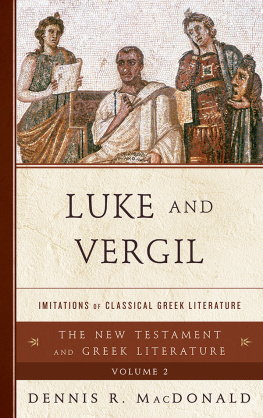
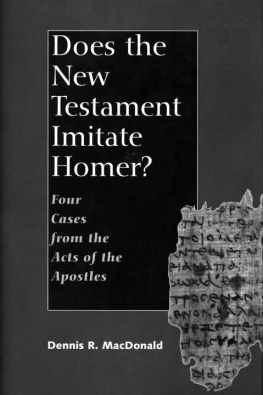
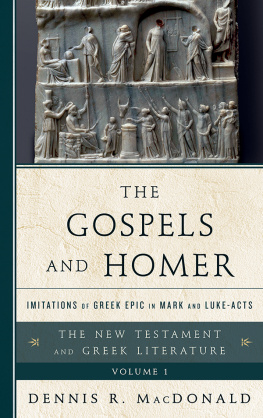

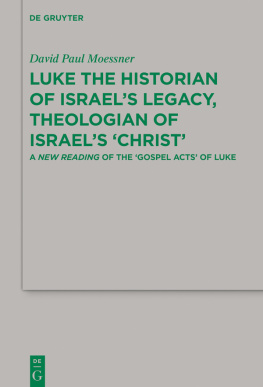
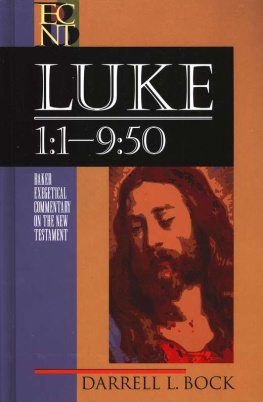
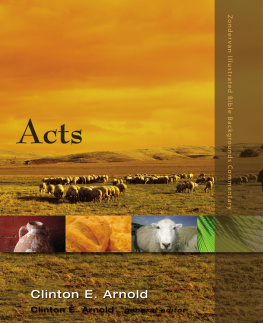
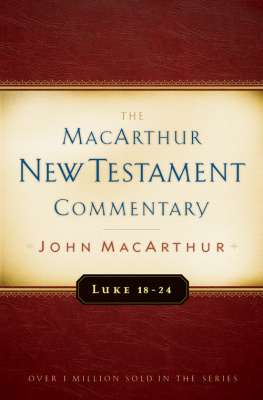
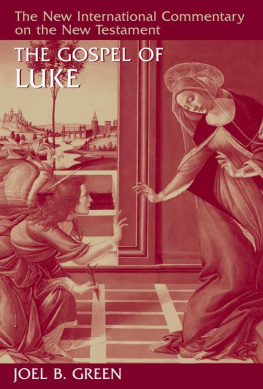
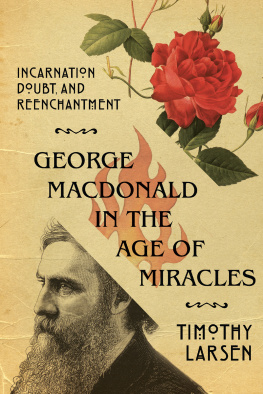
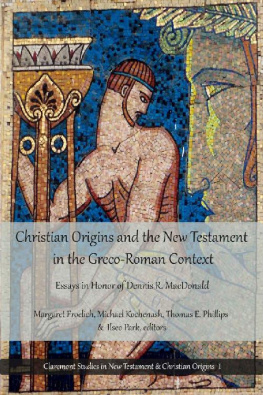
 The paper used in this publication meets the minimum requirements of American National Standard for Information SciencesPermanence of Paper for Printed Library Materials, ANSI/NISO Z39.48-1992.
The paper used in this publication meets the minimum requirements of American National Standard for Information SciencesPermanence of Paper for Printed Library Materials, ANSI/NISO Z39.48-1992.